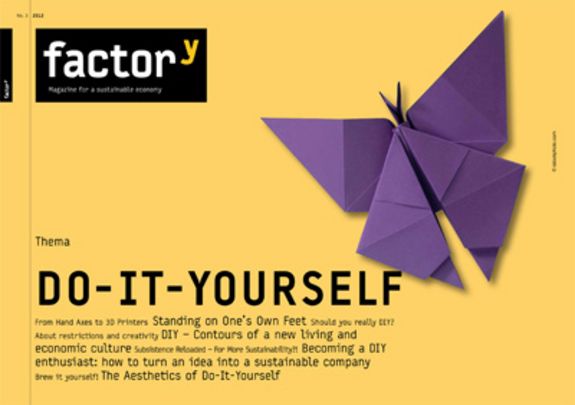Do-it-yourself

Should you really DIY? About restrictions and creativity

There are many arguments against DIY, including our lack of professionalism and that we put a lot of time and resources into DIY. We are already doing too much ourselves and now we feel the need to re-invent ourselves on top of that.
By Birger P. Priddat
Translated by Alina Junk
In an ultramodern, dynamic society that is based on the division of labour, it is at the very least worth noticing if someone does everything themselves. It is a somewhat archaic attitude which is not improved by the motto ‘simplify your life!’. This motto is more an expression of an attitude that compensates for one’s lifestyle rather than a viable way of life. There is little evidence for the claim that when you do it yourself – whether it is adding onto your house, redecorating, fixing your car, moving, digging up your garden – you save money. However, what we do ourselves often does not lead to high-quality results. Instead of doing something we are qualified to do, we do amateur work in domains in which others could do a much better, faster and cheaper job. This is a means of de-professionalisation.
Resolving these questions is not that easy in a society in which we are more likely to prepare our own food than to go to a restaurant. There is a deep structure to DIY which we have gotten used to so much that we barely even notice it any more. Why would we buy pricey machines that are only actually washing clothes in three percent of the time we own them, when instead we could pay someone to pick up our dirty laundry and return it to us nice and clean on a fixed date?
Services which guarantee getting us where we want to be on time have more benefits than owning a car we still have to drive ourselves – which severely limits other potential uses. In this world, driving services are smart supplies as opposed to having unused capital in your garage. What is the use of having 1.5 tons of steels just sitting there for more than 20 hours and getting only two to three hours of use each day? This example characterises property as a symbol of uselessness.
If we start thinking about how we have gotten used to handling so many aspects of our lives ourselves – pumping gas, assembling furniture, operating an ATM, separating waste, grocery shopping and even carrying our own bags, mowing the lawn and sweeping up leaves etc. – we should be surprised at how inefficiently we spend our lives. In Japan, groceries are delivered to customer’s homes, at least in larger cities. For the Japanese, shopping is not a stressful process, since it does not involve carrying heavy bags across town or at best to the car on the other end of the parking lot. They can move around free of stress – they feel liberated.
However, the tendency to do things ourselves is growing. We take it for granted that we pump our own gas or get our money from the ATM and refer to this as prosumption, a combination of consumption and co-production. The same goes for electronically managing our bank account ourselves. Today, we are used to these man-machine interfaces to such an extent that we mistake them for a modern version of a division of labour. We can see something changing here indeed; instead of having to go to the bank, we can quickly handle bank matters online.
While having others provide services that ease our burden is something we consider unprofessional in the areas named above, we accept these services whenever they are presented technologically. We save time by moving around in the virtual world instead of the real world. Since we spend so much time in front of a computer screen without moving, we spend our time at the gym or a wellness spa – and even pay for it. The time we spend working out is more than the time we save thanks to virtual high-tech services.
Online, we experience new forms of teamwork. While we are using information, knowledge and narratives online, at the same time, we are also putting information, knowledge, personal data, and pictures online – in various social networks, chat forums, blogs etc. By extensively using this knowledge universe, which is based on a division of labour, we also supply it with everything we produce online ourselves. It is prosumption and co-production based on a division of labour which could never be done by just one person. However, it is a form of social intelligence to which we constantly contribute. The kinds of do-it-yourself which arise from this, the ‘web creativity’, include old impulses on the one hand but are also a way of producing for others.
The virtual realities created like this work as new social realities in social networks, for example as some kind of an approval-exchange-production cycle. What was described as prosumption above now receives a new kind of reality. By consuming/copying, networkers re-invent themselves as a remixed version of themselves (created online from their homes). By doing this, they re-invent themselves for others. They introduce themselves to others in the way they believe to be the right way to get approval, relevance and web presence.
Consumption stops being private acquisition and starts creating transformational goods that change the user, as the latter presents himself differently in order to be perceived by others differently. We are experiencing – our humanistic readers might want to turn their heads away for a moment – an educational procedure which is community-oriented. It is not private consumption but more like some kind of prosumption which is publicly available online. The other users from whom we re-invent ourselves consume what we upload. Consumption is done both by the ones we re-invent ourselves for and by ourselves since we consume their approval or feedback. In an unexpected way, societies are shaped: online communities. Since we re-invent ourselves for the online community, it is all about connectedness. While traditional do-it-yourself was a human/thing relationship, re-invent-yourself is more of a human/human relationship in cyberspace. We act as performers and give ourselves a personality in which we rehearse and experiment with new means of meeting others. What this means for society and its varieties of identities is still unclear. But instead of tiring themselves with physical work – ‘people of action’ controlling matter – modern online users are auto-productive in online communication – and while re-inventing themselves they can be seen the same way they can see others. People start working on ‘social issues’.?
Philosopher and Economist Birger Priddat is head of the Lehrstuhl für Politische Ökonomie (chair of political economy) at the private Witten-Herdecke University in Germany. His fields of research include culture, art and economy in the widest sense and his newest book in co-operation with Klaus-W. West ‘Die Modernität der Industrie’ deals with the modernity of industry.
Beiträge online
DO-IT-YOURSELF

- From the handaxe to desktop fabrication
- Standing on One’s Own Feet
- DIY – Konturen einer neuen Lebens- und Wirtschaftskultur
- Should you really DIY?
- The Aesthetics of Do-It-Yourself
- Dann brau es doch selbst!
- Faires, Gutes und Schönes
News zum Thema
- 10/2013 | Crowdfunding for Sustainability-Maker
- 08/2013 | A Map for sustainable shopping in NRW
- 08/2013 | Start of the english version of factory
- 01/2013 | Unmotivated, uninspired, uninvolved
Themen
- The Domino Effect: the Mobility Transition as an Engine for the ‘Great Transformation’
- Cities Use the Space
- Decarbonization by 2030
- The fear of biting the hand that feeds you
- Where investing is a pleasure
- Why divestment is going to change the world
- A Robin Hood tax for climate protection
- May the Force Be with Us
- Modern Strategies
- The prerogative of interpreting the future now lies with the companies involved in climate protection”
- From Negotiating to Trading Equitably
- Can a donkey be tragic?
- Rethink rather than rebound: a sufficiency revolution must precede the efficiency revolution
- On Rebound, Prebound and Performance Gaps
- So Let Us Seize Power Then!
- With Common Property Against Political Failure
- So Let Us Seize Power Then!
- The Comforting Beauty of Failure
- “It Is Not Impossible at All.“
- Resource-light shopping
- Men Have Not Stopped Giving the Advantage to Women – So Far
- Toothpaste for Princesses and Soup for Pirates
- It is about equality
- A nice day
- Initiative instead of frustration
- The right ingredients
- Resilient for Life
- Not only, but also
- Appreciation – more please!
- Worth more than money
- Learning to value the value of goods
- Worth and Values
- The Transformative Power of Science
- Historically effective: How innovation and technology transform
- The Disappearance of Products
- Growing Older 101
- Columbus’ Egg
- It Works! In Theory at Least ...
- What If...?
- Analysing Separately – Thinking and Acting Together!
- Let’s Break Away from Determined Breaking Points
- More Gold in Waste than in Mines
- The art of separation
- Should you really DIY?
- The Aesthetics of Do-It-Yourself
- Standing on One’s Own Feet
- From the handaxe to desktop fabrication
- Using Shares to Survive the Crisis
- When Citizens participate
- Possess to Participate
- The Right Growth at the Right Time
- Gunter Pauli and Blue Economy
- When Sustainability Grows
- How we treat Growth
- Illusions about Growth

